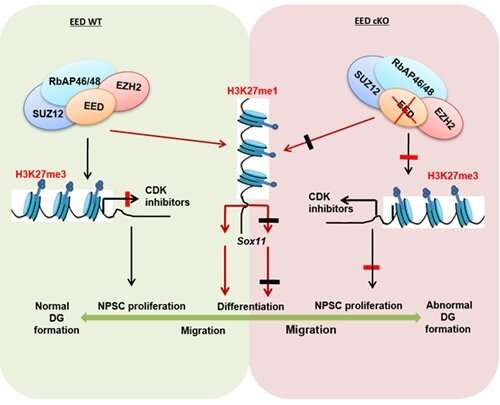Polycomb protein EED plays a starring role in hippocampal development

The dentate gyrus (DG) is the input region of the hippocampus and plays an important role in learning and memory. Although emerging evidence suggests that abnormal expression of the polycomb repressive complex 2 protein (PRC2) might cause neurological disease, the underlying molecular mechanisms had not been explored until recently.
Now, in a study published in Stem Cell Reports, a team led by Prof. Liu Changmei from the State Key Laboratory of Stem Cell and Reproductive Biology, Institute of Zoology of the Chinese Academy of Sciences, has shown that the PcG protein EED is essential for the proper formation of the DG.
By generating an EED conditional knockout mouse model, the researchers found that disruption of EED resulted in postnatal lethality, impaired migration of granule cells, loss of the subgranular zone (SGZ), and a severely disrupted secondary radial glial scaffold in the hippocampus.
They then identified Ink4a/Arf (Cdkn2a) and Sox11 as key downstream targets of EED with distinct functions in modulating the proliferation and differentiation of neural stem/progenitor cells (NSPCs) in the DG.
They also for the first time provided functional and molecular evidence supporting the essential role of EED-mediated H3K27 methylation in the reorganization of NSPCs during DG development.
This study establishes EED as an important modulator of hippocampal development and provides novel mechanistic insights into the complex role that EED plays in brain development and neurological diseases.
More information: Pei-Pei Liu et al, Polycomb Protein EED Regulates Neuronal Differentiation through Targeting SOX11 in Hippocampal Dentate Gyrus, Stem Cell Reports (2019). DOI: 10.1016/j.stemcr.2019.05.010















